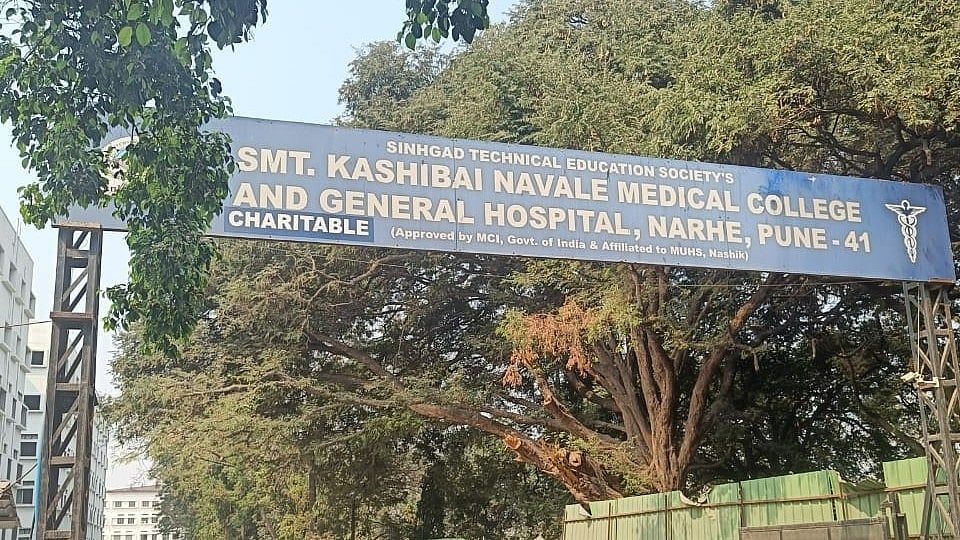
Parents of children diagnosed with Guillain-Barré Syndrome (GBS) at Kashibai Navale Hospital and Medical College (KNHMC) have alleged medical negligence, claiming that improper treatment has worsened their children’s conditions.
The hospital in Narhe, run by the Sinhgad Technical Education Society (STES), has treated six paediatric GBS cases so far and though three of the patients were released and one has been shifted to the general ward, two children are currently in the intensive care unit (ICU), with one among them facing an imminent amputation of his hand from the wrist.
Infection led to amputation, alleges father
Tanaji Bagade, a resident of Kirkedwadi, said his 8-year-old son initially experienced lower limb weakness before his condition worsened, leaving him paralysed. He was moved to the ICU and placed on a ventilator the same day he developed an infection in his hand due to intravenous immunoglobulin (IVIG) therapy, a treatment given to GBS patients to mitigate the immune response.
“The infection has now spread throughout his hand, and doctors have informed us that his wrist will have to be amputated,” a KNHMC official confirmed. However, Bagade holds the doctors responsible.
“On Jan 15, my son fainted in the school playground. We rushed him to a paediatric hospital nearby, and the doctor referred us to KNHMC. He was admitted the same day. Initially, the doctors said he had a weakness, but by night, his condition deteriorated, and he was shifted to the ICU,” Bagade told The Free Press Journal (FPJ).
“After multiple tests, doctors confirmed on Jan 17 that he had GBS and recommended IVIG treatment. They inserted needles into his veins, but that night, we noticed swelling in his hand. We informed the doctors, and they removed the needle, inserting it into the other hand. The next day, they told us the infection required surgery. If not done, they might have to amputate his hand. We agreed to the surgery, but it failed, and his condition worsened. Now, they are saying they will have to amputate his hand from the wrist,” a tearful Bagade said.
He further alleged that doctors delayed the procedure. “For the past 10 days, they have made us run from pillar to post. Now, they will finally perform the surgery tomorrow and remove his wrist. My son is already paralysed—he can only move his head and eyes. He is on ventilator support, and now they will amputate his hand. This is heartbreaking! My son is battling a disease, and due to the doctors' negligence, he will lose his hand,” he claimed.
Bagade, a daily wage worker, said that while his son's treatment is covered under a government scheme, he has spent Rs1.5 lakh on medicines and injections, borrowing money from relatives. “We are struggling financially and feel helpless,” he added.
Another parent alleges negligence
Devidas Kadam, a resident of Kolehwadi, whose 8-year-old daughter was diagnosed with GBS on Jan 16, also alleged medical negligence.
“There was negligence for sure. My daughter was undergoing plasma therapy when my wife noticed redness and rashes on her face. When we asked the doctor, they gave her an injection, and she stabilised. Later, I found out that the injection should have been administered before plasma therapy, not after,” Kadam alleged.
He also expressed concern over Bagade’s son. “My daughter is in the same ICU where his son is being treated. His condition has worsened due to medical negligence,” he told the FPJ.
Supporting Bagade’s claims, Narendra Hagawane, former sarpanch of Kirkedwadi, said, “I have been involved in this case since the beginning. I believe that due to negligence by doctors and staff, the boy’s hand will now be amputated. Authorities will try to cover up the issue, saying the complication was a side effect and not the doctors' fault.”
Doctors deny negligence
Dr Sanjay Natu, professor and head of KNHMC’s paediatric ward, dismissed allegations of negligence.
“There is no lapse from our side. This is a medical side effect of the treatment. We have also informed the family that if they are not satisfied with the treatment, they are free to shift him to another hospital,” Dr Natu said.
“When the boy was admitted, GBS cases were new to us, and we were not initially aware it was GBS. We conducted normal screenings and tests, suspecting a possible stroke. Once GBS cases were reported, we tested him, and the results confirmed it. We then started the recommended treatment, which includes plasmapheresis and IVIG,” he added.
Dr Natu explained that the treatment has a known side effect called a thromboembolic condition, where a blood clot breaks off, travels through the bloodstream, and obstructs a blood vessel, causing tissue ischemia and organ damage. “This condition has led to the need for amputation,” he claimed.